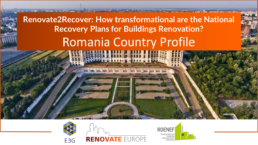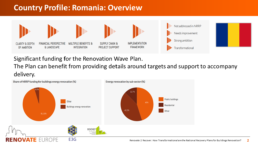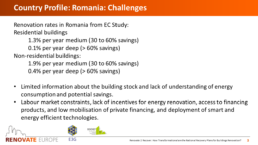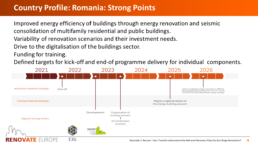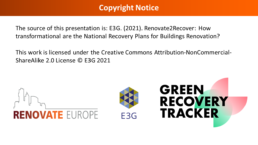NATIONAL SUPPORTING PARTNER OF THE CAMPAIGN
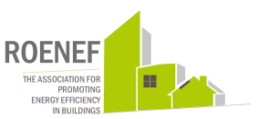
ROENEF aims to facilitate an open dialogue between the central authorities and the community of practitioners and the business environment in the energy efficiency sector in buildings, promoting, in a transparent way and respecting the principle of technological neutrality, solutions and priorities for modernizing Romania’s economy and transforming it into a an energy efficient economy.
Social Media and Website:
2021 - Renovate 2 Recover: How Transformational are the National Recovery Plans for Buildings Renovation?
National Recovery and Resilience Plans (NRRPs) present a unique opportunity to accelerate the delivery of deep renovation across the EU. The analysis of the NRRPs in this Study demonstrates that significant renovation activity is planned and will be made possible through the successive disbursements of the Recovery Funding. But these renovations must be done properly, and the money must be spent well. This unprecedented additional injection of public funds must set the EU building stock firmly on the path to achieving its Renovation Wave goals to 2030 and meeting the 2050 climate targets.
For NRRPs to be transformational towards achieving these goals, two key aspects need to be strengthened:
- Ensure funding delivers a step change towards realising deep (or staged deep) renovations, going well beyond the 30% minimum energy saving recommendation set by the European Commission.
- Invest in the right enabling framework, including leverage of private finance, to create sustainable renovation markets that will grow beyond 2026.
Romanian profile from the study commissioned by the Renovate Europe Campaign and conducted by E3G with input from ROENEF.
ADDITIONAL INFORMATION
- European Semester Country Specific Recommendations 2020
UNDP/GEF Financing Programme

Photo credit: Mihai Moia
This programme was designed with the specific objective of reducing GHG emissions in the buildings sector in Romania and to do it by reducing energy consumption in buildings occupied by low-income households in the various regions of Romania.
This programme was a joint undertaking of the United Nations Development Programme and the Romanian Ministry of Regional development. It was funded by a grant worth around €2.75m and the evaluation of the project reports that this leveraged investments in the order of €447m in energy renovation of low-income housing. The project was set up in such a way that beneficiaries only had to co-finance about 3.5% of the cost of their renovation works.
In addition to improving the energy performance of a large number of homes and public buildings, the project had a further objective to raise the understanding and knowledge of the building professionals in Romania on the need to consider the energy performance of the building stock in their work and to increase the shill sets of these professionals. The evaluation reports that this was also successfully achieved with more than 800 professionals reported as having improved skills at the end of the project.
Another notable output of the project was the development of (standardised) project documentation for the renovation of 50 different apartment types in Romania. The existent of this documentation made the job of preparing tenders for the various projects much easier for the administrations in the various regions of Romania
Principle Characteristics of the Incentive Programme:
| Type of Programme: | Grant-aiding programme aimed at alleviating energy poverty |
| Year of initiation: | 2010 |
| Number of buildings: | 114 buildings in total, ranging from multi-family blocks to public buildings and some individual households |
| Measures implemented: | Insulation of roofs and walls, replacement of windows and doors, installation of renewable energy sources and replacement of heating systems |
| Results: | Energy savings of 7,351 MW – Reduced CO2 emissions by around 4.4 Mt per year |
| Energy performance: | Depending on the building type, savings in the range 47 to 52% were achieved |
| Cost of the works: | The funding leveraged €447m in total investments |
| Technical consultants: | UNDP |
UNDP evaluation of the programme: https://erc.undp.org/evaluation/documents/download/9569

